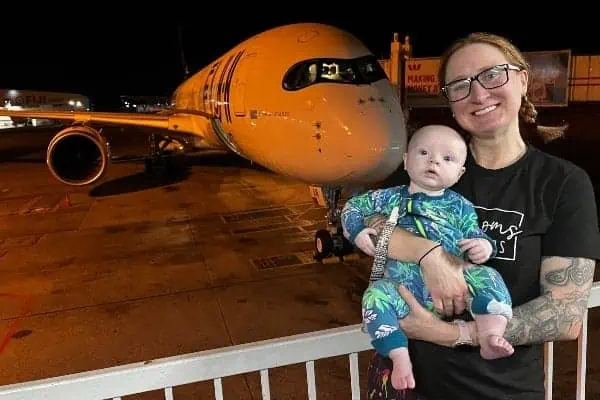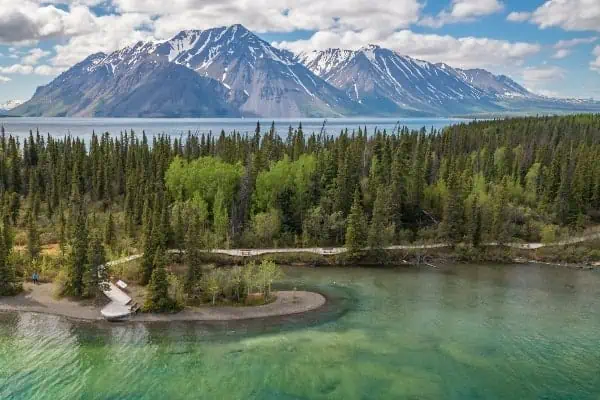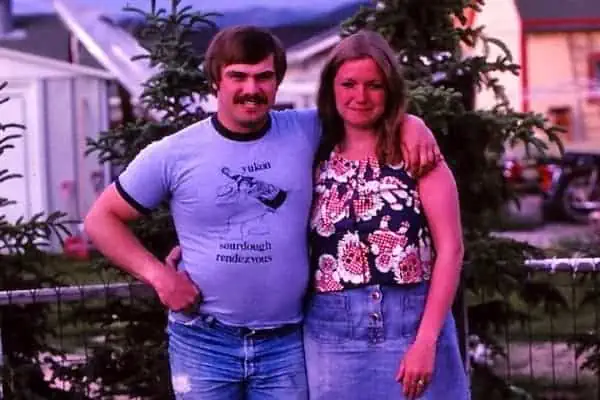To hear Hugh Kitchen tell it, operating a Northern aviation business seems a lot like trying to romance a porcupine. Besides needing opportunity, courage and excellent timing, “you have to be flexible and fast on your feet.”
Kitchen ought to know. He’s been involved with Whitehorse-based Alkan Air for the past 35 years, both as a pilot and as a long-time partner in the company, which officially turns 40 years old on October 21.
After getting his pilot’s licence in the late 1970s, he flew for three years with another fledgling Yukon company, Air North (which also turns 40 this year) before joining Alkan Air in 1982.
At that time, the company was still being run by its three founders, Joe and Win Muff and Barrie Watson. When the Muffs left to pursue other business opportunities in 1987, Watson persuaded Kitchen to become a partner.
“At first I didn’t want to. I just didn’t feel that I had the knowledge, or was confident enough,” he admits.
“But then, as I kind of got more involved in the day-to-day business end, it looked like a pretty good investment. I certainly don’t regret it. It worked out really well for me. I love flying, but I really enjoyed the business end of it as well.”
Although the company now has 70 people in its personnel roster, Kitchen recalls some fairly lean times.
“I remember back in the mid-’80s, we’d get laid off in the winter time, and it would be Barrie, Joe and Win sitting there for a couple of months, hoping the phone was going to ring,” he says.
“At that time, we were mostly a summer operation. There were some pretty slow times there, with less than half a dozen people.”
At one point, Alkan ran regularly-scheduled flights to Watson Lake, Faro, Ross River, Mayo, Dawson, Old Crow and Inuvik, although that service later got whittled down to just Old Crow and Inuvik.
In the late ’90s, the company faced both a major slump in the crucial mining and exploration business, and changes in aviation rules that led to aggressive competition from Air North for scheduled flights.
“When they brought the Hawker-Siddeleys in, that was kind of a game-changer in the scheduled service business. They basically just pushed us out of there with the Hawkers. We were just using the smaller aircraft.”
That’s when Watson, as majority partner, decided the company should focus on the charter side of its business, including the increasingly-important air ambulance flights it conducted for the Yukon government.
“Alkan had been involved in medevacs even before I was there, but it was kind of an ad hoc service. They would just call,” Kitchen explains.
Eventually, this grew into a share program, where Trans North, Alkan Air and Air North would each do it for a month, “which just created chaos,” he adds.
“In the middle of the night, the nurses would never know where to go or who was on call. And you didn’t really need to have an airplane available. So if they called up and your airplane was away, they would just call the next guy.”
In the early 1990s, the government moved to a dedicated-contract system in which the successful bidder agreed to have aircraft and flight crew available at any time. Alkan Air has been the successful bidder ever since that program began.
In 1993, Watson hired a new employee in the company’s accounting department. Raised in the Yukon from infancy, Wendy Tayler always knew she wanted to pursue a business career.
“I came here at 20 years old for an accounts receivable job. It was an opportunity to use my education that I had at that point, and I very quickly fell in love with the industry,” Tayler says.
“Not just the aviation industry, but also the exploration and mining industry we serve, and the air ambulance component of this business. Both of those are near and dear to my heart, and near and dear to the heart of the company.”
By 2000, frustrated because there seemed to be no opportunity to become a partner, Tayler left Alkan Air, intending to move to Calgary and work for WestJet. She took what was to be an interim job with the Hougen Group of Companies in Whitehorse.
When Watson retired in 2008, Tayler says, she was “delighted” to come back to Alkan as a minority partner. For the next four years, she and Kitchen took “joint leadership roles” in the company.
“The timing of that transaction was fantastic, because it was during the last spike in the mining industry and the aviation industry. And at that time, we were able to make some significant strides.”
Those strides included buying a number of new aircraft, as well as building a new hangar to replace the one the company had bought from Crown Assets Disposal after the previous owners went broke in 1981.
“A hangar is a direct cost, so you tread cautiously when you’re putting those kinds of buildings up,” Kitchen says.
But in 2009, it became a necessity.
“We were very busy down in Atlin, when Redfern Resources was going gung ho. And with the regulations nowadays, you have to have a facility that will hold your largest aircraft. You can’t do maintenance out in a snowbank any more.
“We had brought the Twin Otter online, and we needed to do maintenance, so we pulled the trigger on the hangar. We were just moving into it when Redfern fell apart, so there were some tense moments there, for sure.”
In 2012, Kitchen decided to sell his shares and retire, although he still works as a line pilot and owns two aircraft that he leases back to the company.
The four years Kitchen and Tayler spent steering Alkan Air together witnessed a “growth spurt” that Tayler calls “a really exciting time for our company, and a very enjoyable period for Hugh and me.”
Now, as majority partner and company president, and with a few new partners added into the mix, Tayler says the company has entered it next growth phase.
One sign of growth is the flight school it opened two years ago, in “a great partnership” with Yukon College (Tayler’s alma mater, where she obtained her qualifications as a Certified Management Accountant).
Another is last year’s re-introduction of scheduled service to Watson Lake, using a three-seat Seneca, which is off to a promising start, according to Tayler.
A third part of the growth spurt is the acquisition of a hangar in Nanaimo, B.C.,and the deployment of two aircraft to that Vancouver Island community. The Nanaimo hangar and operations base had its official opening on September 19 this year.
One of the two aircraft there is a Beech 1900, used to facilitate twice-weekly crew changes at the Silver Tip mine near Watson Lake, as well as other charter operations around B.C.
The other is a King Air 300, dedicated to providing air ambulance service for the travel insurance business across North America and elsewhere.
“We have gone to Greenland and Iceland. We were in Cuba the day before President Obama. We’ve also been to Costa Rica and we go to Mexico regularly. With the snowbird traffic, we do a great number of flights to Arizona,” Tayler says.
With a current fleet of 18 fixed-wing craft, the 40-year-old company is going stronger than ever.
Chalk it up to timing, courage, and flexibility.




